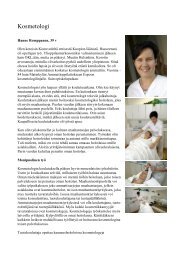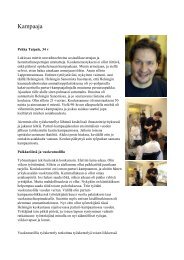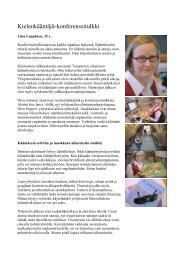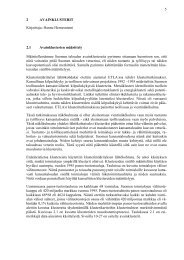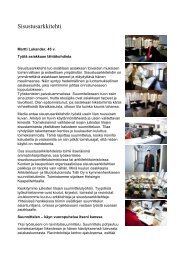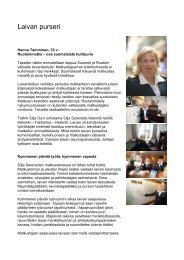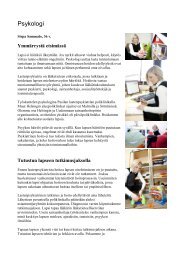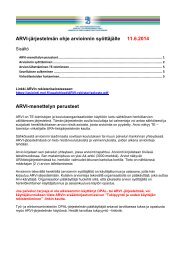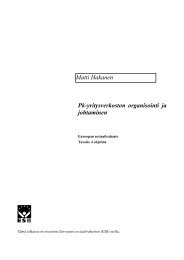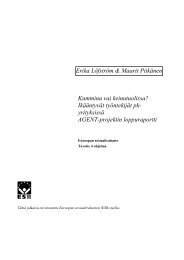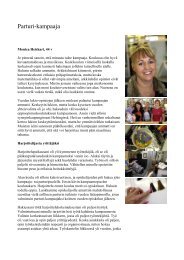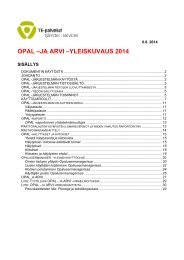Working Life Barometer in the Baltic Countries 2002 (pdf) - mol.fi
Working Life Barometer in the Baltic Countries 2002 (pdf) - mol.fi
Working Life Barometer in the Baltic Countries 2002 (pdf) - mol.fi
You also want an ePaper? Increase the reach of your titles
YUMPU automatically turns print PDFs into web optimized ePapers that Google loves.
123<br />
In all three countries an overwhelm<strong>in</strong>g majority, 80 – 90 % of <strong>the</strong> work<strong>in</strong>g<br />
population, were sceptical as to development <strong>in</strong> <strong>the</strong> purchas<strong>in</strong>g power of <strong>the</strong>ir<br />
salary. Those who def<strong>in</strong>itely believed <strong>the</strong> most (17 %) <strong>in</strong> an improvement <strong>in</strong><br />
purchas<strong>in</strong>g power after one year were <strong>the</strong> Latvians. The Estonians and Lithuanians<br />
were clearly more sceptical. Despite <strong>the</strong> low proportion (10 %) believ<strong>in</strong>g<br />
<strong>in</strong> purchas<strong>in</strong>g power improvement <strong>in</strong> Lithuania, <strong>the</strong> percentage has risen compared<br />
with 1998; <strong>in</strong> Estonia, by contrast, it has dropped slightly 5 .<br />
On <strong>the</strong> whole, <strong>the</strong> work<strong>in</strong>g people of Latvia - whe<strong>the</strong>r <strong>in</strong> <strong>the</strong> public or <strong>the</strong> private<br />
sector, men or women - are clearly more optimistic than those of Estonia<br />
and Lithuania. In Lithuania, belief <strong>in</strong> improvement of purchas<strong>in</strong>g power is a<br />
little weaker still than <strong>in</strong> Estonia. The differences between <strong>the</strong> countries reflect<br />
very accurately <strong>the</strong> changes of <strong>the</strong> last few years. The real salary level <strong>in</strong> Latvia<br />
has risen. In Estonia, <strong>the</strong> <strong>in</strong>crease <strong>in</strong> consumer prices has eaten away <strong>the</strong><br />
raises <strong>in</strong> salary. In Lithuania, on <strong>the</strong> o<strong>the</strong>r hand, very few are receiv<strong>in</strong>g an <strong>in</strong>creased<br />
salary and <strong>the</strong> changes have been small.<br />
From <strong>the</strong> pro<strong>fi</strong>les of those believ<strong>in</strong>g that <strong>the</strong> purchas<strong>in</strong>g power of <strong>the</strong>ir salary<br />
would improve <strong>in</strong> <strong>the</strong> com<strong>in</strong>g year, it can be seen that - <strong>in</strong> all <strong>the</strong> <strong>Baltic</strong> countries<br />
- <strong>the</strong> men are def<strong>in</strong>itely more optimistic about this than <strong>the</strong> women. Many<br />
Latvian men <strong>in</strong> particular believe <strong>in</strong> such an improvement. Private-sector<br />
workers regard <strong>the</strong> future more positively than those <strong>in</strong> <strong>the</strong> public sector.<br />
Improvement <strong>in</strong> purchas<strong>in</strong>g power is believed <strong>in</strong> more at new workplaces than<br />
at <strong>the</strong> reorganised and <strong>the</strong> old ones. <strong>Work<strong>in</strong>g</strong> people at reorganised workplaces<br />
<strong>in</strong> Lithuania have been exceptionally sceptical. It was seen above that <strong>in</strong> <strong>the</strong><br />
past, salary development at new workplaces was poorer than at old ones, on<br />
average. The fact that <strong>the</strong> purchas<strong>in</strong>g power of salaries is never<strong>the</strong>less believed<br />
<strong>in</strong> at new workplaces, <strong>in</strong>dicates that <strong>the</strong> decrease <strong>in</strong> average salaries is a result<br />
of <strong>the</strong> birth of new workplaces with lower pay than before, ra<strong>the</strong>r than reduction<br />
of exist<strong>in</strong>g workers' salaries.<br />
In Latvia, manual workers reckon nearly as often as <strong>the</strong> o<strong>the</strong>rs that <strong>the</strong> purchas<strong>in</strong>g<br />
power of <strong>the</strong>ir salaries will grow. In Lithuania, on <strong>the</strong> o<strong>the</strong>r hand, <strong>the</strong><br />
correspond<strong>in</strong>g proportion is very low. Among <strong>the</strong> various categories of work-<br />
5 In 1998 <strong>in</strong> Estonia, 12.5 % of <strong>the</strong> work<strong>in</strong>g people believed that <strong>the</strong>ir purchas<strong>in</strong>g power would improve<br />
dur<strong>in</strong>g <strong>the</strong> com<strong>in</strong>g year; <strong>in</strong> <strong>2002</strong>, 11.2 % thought that way.




